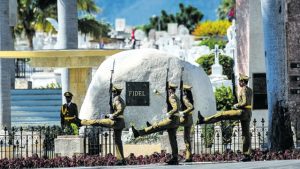
A guard of honour stays by the tomb of Cuban leader Fidel Castro at the Santa Ifigenia cemetery in Santiago de Cuba yesterday.
SANTIAGO de CUBA, Cuba (AFP) Fidel Castro’s ashes were entombed in a massive stone next to national heroes on Sunday, as Cuba opens a new era without the communist leader who ruled for decades.
President Raul Castro placed his brother’s cedar urn inside the tall round monolith near the mausoleums of 19th century independence icon Jose Marti and comrades of Castro’s rebellion in the eastern city of Santiago de Cuba.
Capping a week of massive tributes, a simple, dark green marble plaque bearing just his first name — “Fidel” — was placed over the niche at the Santa Ifigenia cemetery.
Raul Castro gave a military salute at the private ceremony attended by his family and some foreign dignitaries, including Latin American allies from Venezuela and Nicaragua, according to official photos.
“There were no speeches. It was very simple. There were just the ashes that were interred, the family, the government and officials,” French Environment Minister Segolene Royal, who was criticised in her country for defending Castro’s human rights record, told AFP after the hour-long funeral.
Castro, who died on November 25 at age 90, was revered by supporters for the free health care and education he spread across the island, but vilified by dissidents who saw him as a brutal dictator.
The burial marked the end of nine days of national mourning during which Cubans, often encouraged by the government, flooded the streets to pay tribute to Castro, chanting “I am Fidel!” as his ashes were driven across the Caribbean country.
As a military jeep took the urn toward the ceremony thousands who lined the streets of Santiago shouted, “viva Fidel!”
On Saturday night, Raul Castro led a final rally in his brother’s honour at Santiago’s Revolution Plaza, leading the crowd in a pledge to uphold socialist ideals.
“In front of Fidel’s remains… we swear to defend the fatherland and socialism,” Raul Castro said.
Fidel Castro remained a towering figure in Cuba a decade after intestinal surgery forced him to hand power to his younger brother Raul.
Although he was an omnipresent figure in the lives of Cubans, Raul Castro said the national assembly will fulfil his brother’s dying wish to forbid that any statues be erected in his memory or streets be named after him.
“The leader of the revolution rejected any manifestation of a cult of personality,” Raul Castro said.
Many held an all-night vigil at Santiago’s Revolution Plaza, reading poems and holding pictures of the late leader before his morning funeral.
“For me Fidel is a second god and his death has hurt me a lot,” said 59-year-old restaurant worker Daisy Vera Ramirez.
Marina Brito Carmenati, a 66-year-old retiree who lives near the cemetery, woke up before dawn to bid farewell to Fidel.
“I feel a lot of pain, a lot of sadness. He’s the father to all of us,” she said.
The government nurtured the religious-like fervour, with state media calling Castro the “eternal comandante”.
In the past week, Cubans were urged to go to schools and other public buildings to sign an oath of loyalty to his revolution.
Fidel Castro launched his botched raid on the Moncada military barracks on July 26, 1953, planting the seed of the revolution that triumphed in 1959.
After taking power, Castro became an ally of the Soviet Union and was a thorn in the side of successive US presidents until illness forced him to relinquish power to his brother Raul in 2006.
Raul Castro has implemented modest economic reforms in recent years, restored diplomatic relations with the United States and vowed to step down in 2018.
“No longer under the shadow of his older brother, Raul may now feel freer to pursue the modest economic reforms he initiated in the last decade,” said Jorge Duany, director of the Cuban Research Institute at Florida International University.
While US President Barack Obama has chipped away at the US embargo’s trade and travel restrictions, foreign companies still face obstacles to invest in Cuba.
Food supplies are tight and public services are being cut back while socialist ally Venezuela, which has been providing cheap oil to Cuba, is endureing a political and economic crisis, said Ted Piccone, a senior fellow at the Washington-based Brookings Institution think tank.
Castro needs to pick up the pace of reforms to kick-start the economy and ensure a smooth transition to his successor in 2018, he said.
“The legitimacy of the post-Raul government will depend on a much better economic performance,” said Piccone, a senior foreign policy adviser during Bill Clinton’s presidency.
And while Castro has died, his legacy is not going to vanish overnight.
“Given his outsized impact on Cuba and the region, it’s not really goodbye,” Piccone said. “His memory will cast a shadow over Cuba for a long time.”
